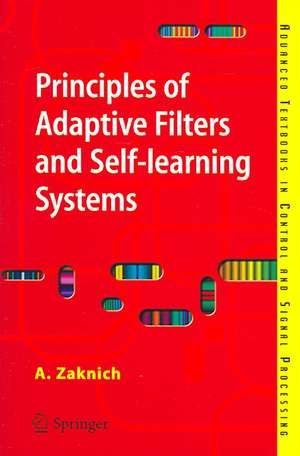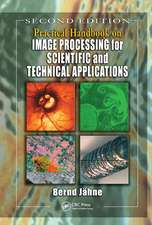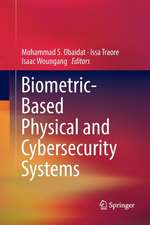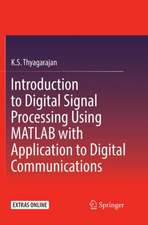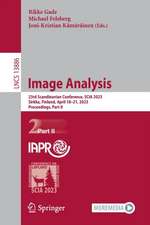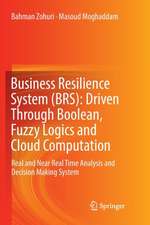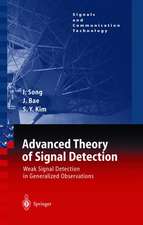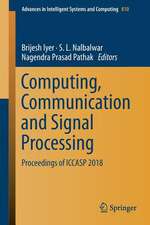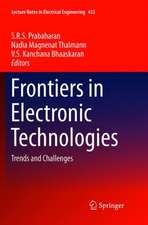Principles of Adaptive Filters and Self-learning Systems: Advanced Textbooks in Control and Signal Processing
Autor Anthony Zaknichen Limba Engleză Paperback – 25 apr 2005
Din seria Advanced Textbooks in Control and Signal Processing
- 17%
 Preț: 460.70 lei
Preț: 460.70 lei - 15%
 Preț: 634.42 lei
Preț: 634.42 lei -
 Preț: 375.67 lei
Preț: 375.67 lei - 15%
 Preț: 570.99 lei
Preț: 570.99 lei - 14%
 Preț: 600.00 lei
Preț: 600.00 lei - 18%
 Preț: 953.96 lei
Preț: 953.96 lei - 20%
 Preț: 572.70 lei
Preț: 572.70 lei - 15%
 Preț: 483.26 lei
Preț: 483.26 lei -
 Preț: 379.10 lei
Preț: 379.10 lei - 15%
 Preț: 480.43 lei
Preț: 480.43 lei -
 Preț: 379.47 lei
Preț: 379.47 lei - 15%
 Preț: 560.31 lei
Preț: 560.31 lei -
 Preț: 358.79 lei
Preț: 358.79 lei - 15%
 Preț: 627.83 lei
Preț: 627.83 lei -
 Preț: 381.14 lei
Preț: 381.14 lei -
 Preț: 381.51 lei
Preț: 381.51 lei - 15%
 Preț: 486.74 lei
Preț: 486.74 lei - 19%
 Preț: 512.14 lei
Preț: 512.14 lei - 20%
 Preț: 321.17 lei
Preț: 321.17 lei -
 Preț: 386.90 lei
Preț: 386.90 lei - 15%
 Preț: 483.26 lei
Preț: 483.26 lei - 15%
 Preț: 633.17 lei
Preț: 633.17 lei - 15%
 Preț: 570.55 lei
Preț: 570.55 lei -
 Preț: 378.00 lei
Preț: 378.00 lei - 19%
 Preț: 625.45 lei
Preț: 625.45 lei - 19%
 Preț: 475.27 lei
Preț: 475.27 lei - 19%
 Preț: 531.48 lei
Preț: 531.48 lei - 19%
 Preț: 535.14 lei
Preț: 535.14 lei - 15%
 Preț: 684.47 lei
Preț: 684.47 lei - 15%
 Preț: 456.91 lei
Preț: 456.91 lei -
 Preț: 375.80 lei
Preț: 375.80 lei -
 Preț: 377.27 lei
Preț: 377.27 lei - 15%
 Preț: 511.97 lei
Preț: 511.97 lei - 15%
 Preț: 574.47 lei
Preț: 574.47 lei - 21%
 Preț: 467.47 lei
Preț: 467.47 lei
Preț: 487.36 lei
Preț vechi: 573.36 lei
-15% Nou
Puncte Express: 731
Preț estimativ în valută:
93.27€ • 98.40$ • 77.73£
93.27€ • 98.40$ • 77.73£
Carte tipărită la comandă
Livrare economică 02-16 ianuarie 25
Preluare comenzi: 021 569.72.76
Specificații
ISBN-13: 9781852339845
ISBN-10: 1852339845
Pagini: 410
Ilustrații: XXII, 386 p. 95 illus.
Dimensiuni: 155 x 235 x 23 mm
Greutate: 0.62 kg
Ediția:2005
Editura: SPRINGER LONDON
Colecția Springer
Seria Advanced Textbooks in Control and Signal Processing
Locul publicării:London, United Kingdom
ISBN-10: 1852339845
Pagini: 410
Ilustrații: XXII, 386 p. 95 illus.
Dimensiuni: 155 x 235 x 23 mm
Greutate: 0.62 kg
Ediția:2005
Editura: SPRINGER LONDON
Colecția Springer
Seria Advanced Textbooks in Control and Signal Processing
Locul publicării:London, United Kingdom
Public țintă
GraduateCuprins
Adaptive Filtering.- Linear Systems and Stochastic Processes.- Modelling.- Optimisation and Least Squares Estimation.- Parametric Signal and System Modelling.- Classical Filters and Spectral Analysis.- Optimum Wiener Filter.- Optimum Kalman Filter.- Power Spectral Density Analysis.- Adaptive Filter Theory.- Adaptive Finite Impulse Response Filters.- Frequency Domain Adaptive Filters.- Adaptive Volterra Filters.- Adaptive Control Systems.- Nonclassical Adaptive Systems.- to Neural Networks.- to Fuzzy Logic Systems.- to Genetic Algorithms.- Adaptive Filter Application.- Applications of Adaptive Signal Processing.- Generic Adaptive Filter Structures.
Recenzii
From the reviews:
"An excellent tutorial for graduate students and a comprehensive introduction for researchers working in adaptive systems. Summing Up: Highly Recommended."
(J. Y. Cheung, Choice, February, 2006)
"An excellent tutorial for graduate students and a comprehensive introduction for researchers working in adaptive systems. Summing Up: Highly Recommended."
(J. Y. Cheung, Choice, February, 2006)
Notă biografică
Anthony Zaknich (M'87-'00) was born in Vela Luka, Croatia, and immigrated to Australia in the 1950s. He received the B.E. (Electronics) and M.E.Sc. degrees from the University of Western Australia (UWA), Nedlands in 1974 and 1986, respectively; the B.A. and B.Sc. (Psychology) degrees from Ambassador University, Pasadena, CA, USA, both in 1978; and the Ph.D. degree from UWA in 1996.
He is currently an Adjunct Associate Professor at UWA, Centre for Intelligent Information Processing Systems (CIIPS) and also at Murdoch University, Perth Western Australia (Division of Science and Engineering). From 1990 to 1999 he held the position of Technical Manager for Industry Projects working as a Research Fellow and Lecturer at CIIPS in the Electrical and Electronics Engineering Department, UWA. His main work at CIIPS was involved with supervision, teaching, research and development related to signal processing and artificial neural networks at the undergraduate, postgraduate and professional-development levels. Previously, he was involved in the research and development of underwater control and acoustic signalling systems in private enterprise, and also in the establishment of a public company, Nautronix Ltd, producing and marketing products in these areas for the international market. He has supervised numerous Honours and ten postgraduate research projects, including three Ph.Ds. He has also authored/co-authored more than 56 refereed papers in technical journals and conference proceedings, has contributed five research book chapters, and authored two books in his areas of interest since 1988. His special research interest is related to integrated sensory-intelligent systems (ISIS): The philosophy, theory and applications of, intelligent signal processing; learning theory; self-learning systems; artificial neural networks; adaptive systems; time-frequency filters and signal analysis; time delay spectrometry; adaptive space-time-frequency signal processing; audio andHi-Fi, and underwater acoustic communications systems.
Dr Zaknich is a Member of the Audio Engineering Society (AES). He served on the IEEE Western Australian Regional Interest Group Committee on Neural Networks at various times since 1993. In 1998 he won the 1996-98, UWA Electrical and Electronics Engineering Department's Outstanding Early Researcher Award, which is given to the best researcher below Senior Lecturer level over any three year period.
He is currently an Adjunct Associate Professor at UWA, Centre for Intelligent Information Processing Systems (CIIPS) and also at Murdoch University, Perth Western Australia (Division of Science and Engineering). From 1990 to 1999 he held the position of Technical Manager for Industry Projects working as a Research Fellow and Lecturer at CIIPS in the Electrical and Electronics Engineering Department, UWA. His main work at CIIPS was involved with supervision, teaching, research and development related to signal processing and artificial neural networks at the undergraduate, postgraduate and professional-development levels. Previously, he was involved in the research and development of underwater control and acoustic signalling systems in private enterprise, and also in the establishment of a public company, Nautronix Ltd, producing and marketing products in these areas for the international market. He has supervised numerous Honours and ten postgraduate research projects, including three Ph.Ds. He has also authored/co-authored more than 56 refereed papers in technical journals and conference proceedings, has contributed five research book chapters, and authored two books in his areas of interest since 1988. His special research interest is related to integrated sensory-intelligent systems (ISIS): The philosophy, theory and applications of, intelligent signal processing; learning theory; self-learning systems; artificial neural networks; adaptive systems; time-frequency filters and signal analysis; time delay spectrometry; adaptive space-time-frequency signal processing; audio andHi-Fi, and underwater acoustic communications systems.
Dr Zaknich is a Member of the Audio Engineering Society (AES). He served on the IEEE Western Australian Regional Interest Group Committee on Neural Networks at various times since 1993. In 1998 he won the 1996-98, UWA Electrical and Electronics Engineering Department's Outstanding Early Researcher Award, which is given to the best researcher below Senior Lecturer level over any three year period.
Textul de pe ultima copertă
Kalman and Wiener Filters, Neural Networks, Genetic Algorithms and Fuzzy Logic Systems Together in One Text Book
How can a signal be processed for which there are few or no a priori data?
Professor Zaknich provides an ideal textbook for one-semester introductory graduate or senior undergraduate courses in adaptive and self-learning systems for signal processing applications. Important topics are introduced and discussed sufficiently to give the reader adequate background for confident further investigation. The material is presented in a progression from a short introduction to adaptive systems through modelling, classical filters and spectral analysis to adaptive control theory, nonclassical adaptive systems and applications.
Features:
• Comprehensive review of linear and stochastic theory.
• Design guide for practical application of the least squares estimation method and Kalman filters.
• Study of classical adaptive systems together with neural networks, genetic algorithms and fuzzy logic systems and their combination to deal with such complex problems as underwater acoustic signal processing.
• Tutorial problems and exercises which identify the significant points and demonstrate the practical relevance of the theory.
• PDF Solutions Manual, available to tutors from springeronline.com, containing not just answers to the tutorial problems but also course outlines, sample examination material and project assignments to help in developing a teaching programme and to give ideas for practical investigations.
How can a signal be processed for which there are few or no a priori data?
Professor Zaknich provides an ideal textbook for one-semester introductory graduate or senior undergraduate courses in adaptive and self-learning systems for signal processing applications. Important topics are introduced and discussed sufficiently to give the reader adequate background for confident further investigation. The material is presented in a progression from a short introduction to adaptive systems through modelling, classical filters and spectral analysis to adaptive control theory, nonclassical adaptive systems and applications.
Features:
• Comprehensive review of linear and stochastic theory.
• Design guide for practical application of the least squares estimation method and Kalman filters.
• Study of classical adaptive systems together with neural networks, genetic algorithms and fuzzy logic systems and their combination to deal with such complex problems as underwater acoustic signal processing.
• Tutorial problems and exercises which identify the significant points and demonstrate the practical relevance of the theory.
• PDF Solutions Manual, available to tutors from springeronline.com, containing not just answers to the tutorial problems but also course outlines, sample examination material and project assignments to help in developing a teaching programme and to give ideas for practical investigations.
Caracteristici
Teaches students about classical and nonclassical adaptive systems within one pair of covers Helps tutors with time-saving course plans, ready-made practical assignments and examination guidance The recently developed "practical sub-space adaptive filter" allows the reader to combine any set of classical and/or non-classical adaptive systems to form a powerful technology for solving complex nonlinear problems Includes supplementary material: sn.pub/extras Request lecturer material: sn.pub/lecturer-material
